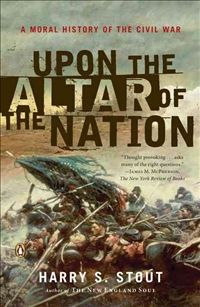That relative failure may not matter all that much because he has done something that is much more interesting and relevant for Australians. He has presented an interesting argument as to why and how the theological arguments developed on both sides of the conflict to underpin a new sense American messianism that emerged as one result of the war.
Stout's account of the dynamic interaction of the progress of the war with the arguments that were developed by the churches and clergy on both sides to justify their support for their respective governments looks plausible or at least arguable and is underpinned by a wealth of documentary evidence from sermons, printed and unprinted by which he tracks the trajectories of the argument as they developed in response to the ebb and flow of the war.
The Civil War was the crucible of modern US identity. If you want to understand how that sense of nationality acquired its deeply religious, messianic character then a reading of Upon the Altar of the Nation will repay a thoughtful reading.
It also provides a reminder of how much the language of religion has now become taken over by the state to justify its use of violence. The "holy" has well and truly "migrated" as William Cavanaugh has recently reminded us. Indeed I am inclined to argue that Stout's work stands as a helpful case study of that migration in the American context.
